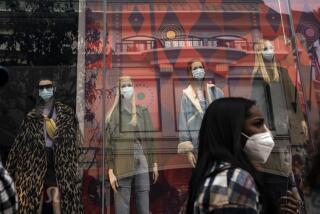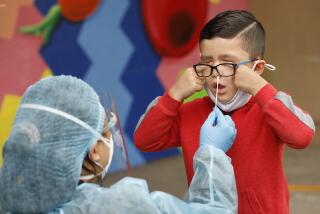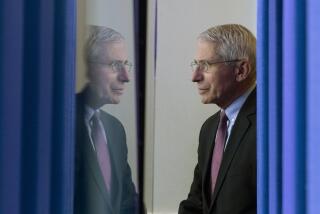‘Normal’ unlikely to come before 2022 as COVID-19 surges unchecked, Fauci says
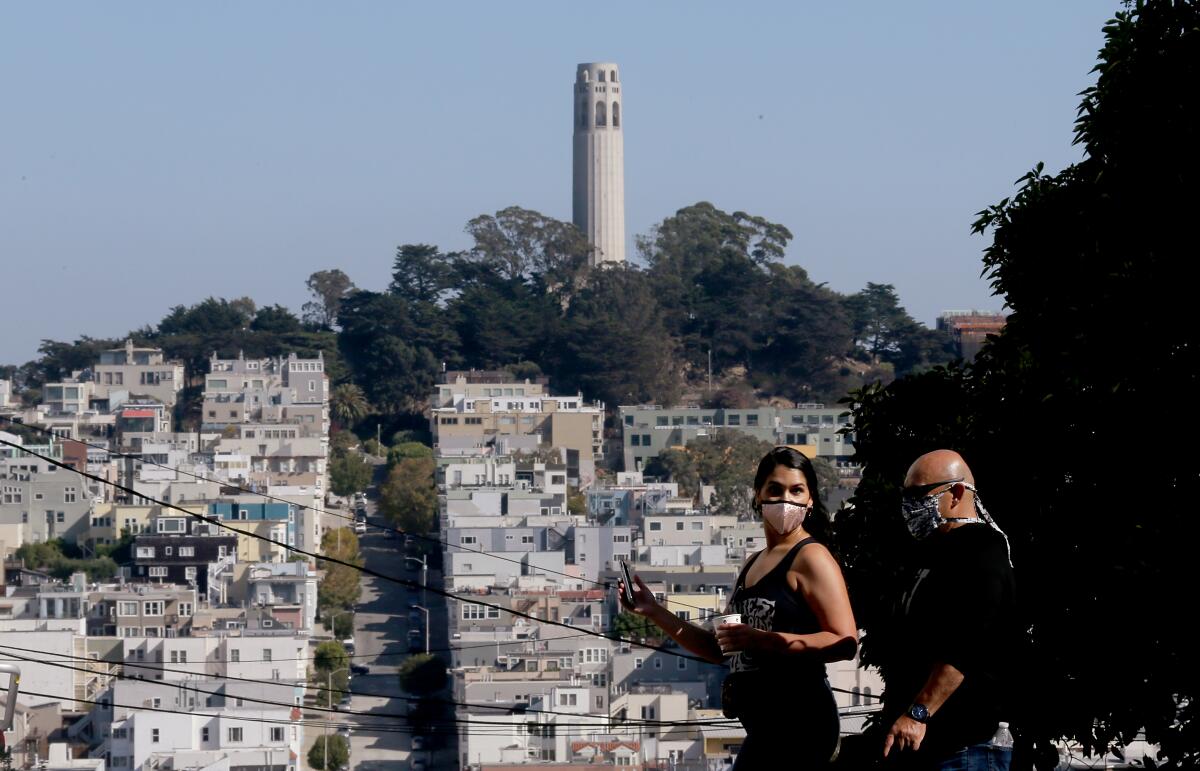
- Share via
SAN FRANCISCO — It may be 2022 before a coronavirus-weary world begins to feel a greater sense of normality, says the nation’s top infectious disease expert, Dr. Anthony Fauci.
If the U.S. can get a substantial proportion of residents vaccinated by around mid-2021, “I think it will be easily by the end of 2021 — and perhaps even into the next year — before we start having some semblance of normality,” Fauci said in candid comments during an online discussion hosted by an Australian university this week.
As a result, it may not be possible to achieve some longed-for hallmarks of normalcy without risking a super-spreading event, one in which a large number of people are infected, Fauci told the University of Melbourne.
Restaurants might not be able to return to full capacity, and professional sports venues may not be able to allow spectators, until late 2021 or early 2022, he said.
Fauci said he could envision people, in masks, returning to theaters at a reduced capacity around mid-2021. But returning to maximum capacity in theaters without requiring masks likely won’t occur until “well over a year” from now.
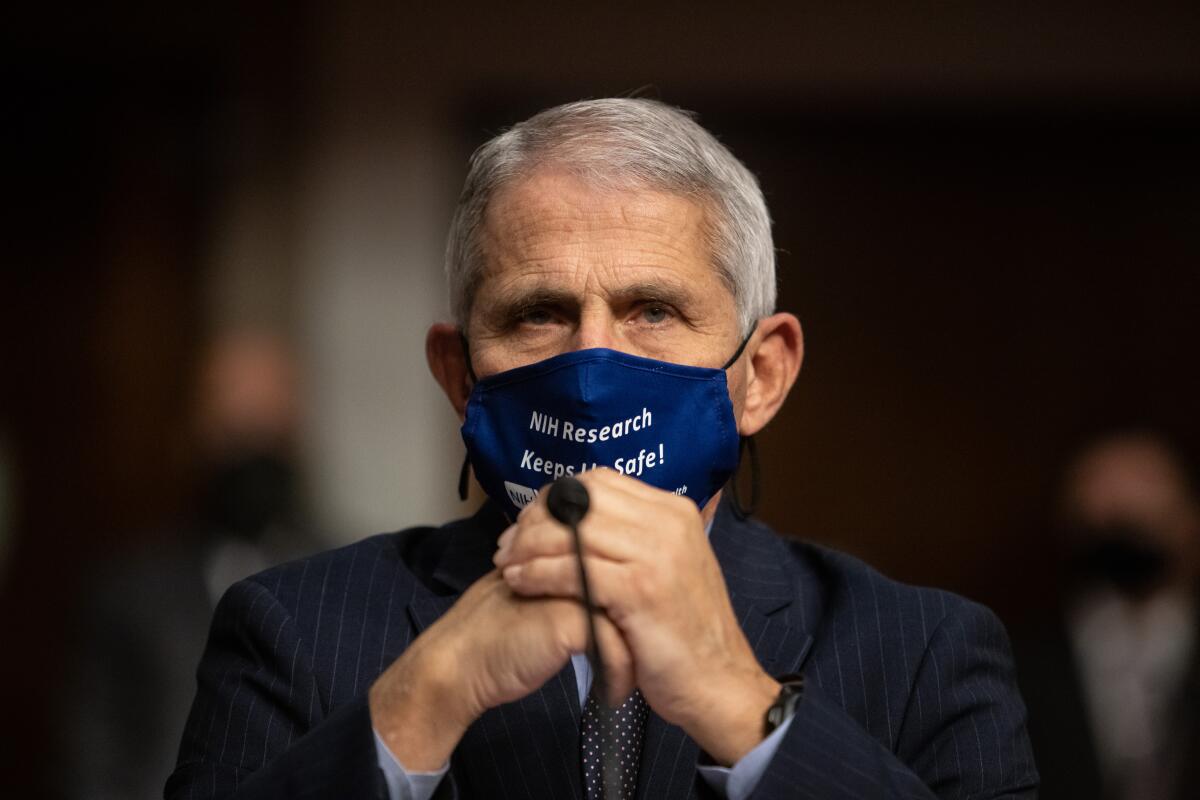
Our sense of what’s normal may also change, Fauci said. He said he believed wearing masks would continue to be common, as it has been in many parts of Asia for decades preceding this COVID-19 pandemic.
Fauci warned that the U.S. was heading in the wrong direction, with more than 227,000 deaths among people with COVID-19 and, on a recent day this week, 83,000 new coronavirus infections reported in a single day. Fauci previously said the U.S. should aim for fewer than 10,000 new cases a day as it headed into winter.
“That is very troubling,” Fauci said. “We’ve got to do better than that.”
Fauci said the differing pandemic control strategies implemented by different states in the U.S. made managing the pandemic more difficult.
“We saw that very clearly when we were trying to open up the economy again,” Fauci said, referring to guidelines he and Dr. Deborah Birx, the White House coronavirus response coordinator, helped develop on when and to what extent regions could reopen the economy.
“That would have been nice if all the states did that the same way,” Fauci said. Instead, “it was like a free-for-all. There was some states that didn’t even pay attention. Some states jumped over one benchmark to the other. And some states tried to do it well, but yet when you looked at the TV screen, you’d see people crowded at bars, with no masks, just essentially causing super-spreading” despite federal guidelines for wearing masks, keeping physically distant, and avoiding crowded settings.
“If everybody had done that uniformly,” Fauci said, “I don’t think we would be in the position we’re in right now.”
A number of experts, including Fauci, are increasingly talking about the need for some type of mask mandate that’s national in scope. Dr. Scott Gottlieb, who served as the head of the U.S. Food and Drug Administration under the Trump administration until 2019, says it’s time for “limited and temporary national mask mandate,” as he wrote in an op-ed for the Wall Street Journal. Fauci has told CNN that “if people are not wearing masks, then maybe we should be mandating it.”
In the Australian city of Melbourne, residents virtually universally wear masks, according to Dr. Sharon Lewin, director of the Peter Doherty Institute for Infection and Immunity at the University of Melbourne, who also spoke on the panel discussion.
“We have universal mask wearing in Melbourne because you’re fined $1,000 if you’re outside not wearing them,” Lewin said. “If you walk on the streets of Melbourne, 99.9% of people are wearing masks, and we did it by fining people.”
Fauci said he wished the widespread mentality of universal masking could be transplanted to the U.S., where wearing masks is perceived as a political statement in some communities and wearers are sometimes ridiculed — “which is so painful to me as a physician, a scientist and a public health person to see such divisiveness centered around a public health issue.”
Apart from a vaccine, Fauci said in his talk with the University of Melbourne, what will be really important in dealing with the coronavirus in the long run will be developing antiviral drugs that can be used to treat those who test positive for the virus.
Fauci said development of antiviral drugs that allowed doctors to “only have to treat them literally for a few days” could “take away the fear and dread of this particular disease.”
There are still some unknowns about the effects of COVID-19.
Scientists still don’t know, Fauci said, how durable immunity is among people who have survived an infection, and whether people can be reinfected by this coronavirus repeatedly, as can occur with common cold viruses.
If people lose immunity fairly quickly after recovering from the coronavirus infection, “we’re going to have a very difficult time over the next few years.”
“If somebody’s antibody response ... diminishes rapidly — so that after a year or so, they’re still susceptible to the same virus that they had a year previously — that’s going to be a real problem,” Fauci said. “That would really be a very, very difficult situation to have a potentially deadly disease that you can continue to have year after year.”
Another unknown is the long-term effects of coronavirus infections among survivors.
There’s increasing worry about so-called “long haulers.” These are COVID-19 survivors “who recover virologically,” Fauci said, “but have a rather substantial persistence of almost debilitating symptoms: shortness of breath, muscle aches, dysautonomia, memory losses, difficulty concentrating.”
Such long-lasting symptoms have been found in some patients who were only moderately sick with COVID-19 and didn’t need hospitalization, as well as among some patients who required intensive care treatment.
This group of people may end up being survivors who “get infected but they’re not necessarily going to be fine. They may have lingering issues, symptomatically and otherwise, or it may lead to secondary issues later on.”
He cited a study in the journal JAMA Cardiology that found that 60% of patients who had recovered from COVID-19 had inflammatory disease of the heart. “Now, that may be irrelevant and it will just clear itself up with no problem,” Fauci said. “But I don’t know that right now.”
Will it mean that many COVID-19 survivors may be more prone to long-lasting complications of the heart, such as cardiomyopathy or arrhythmia? “I don’t know that,” Fauci said. “I hope it’s going to be an inconsequential finding, but these are things that ... I wish I knew.”
More to Read
Sign up for Essential California
The most important California stories and recommendations in your inbox every morning.
You may occasionally receive promotional content from the Los Angeles Times.
